Use Cases¶
The following use-cases are provided for business and individual needs:
- Enterprise KYC
- Insurance Records Keeping
- Corporate Compliances Records Keeping
- Verify Academic Certifications
- Supply Chain Management
- Trustless File Sharing
- Government Regulations
- Land Ownership Record Keeping
- Employee Verification
- Health Record Manifest In Judiciary
Enterprise KYC¶
Storing and Verifying Enterprise KYC/Government IDs on the RecordsKeeper blockchain
KYC procedures and compliance have become increasingly important in the banking industry as regulators are keeping track of banks by noting down with whom they are doing business. This is done to prevent potential money laundering or terrorist financing. Currently, institutions offering financial or professional services are obliged to follow time-consuming and expensive practices for each new customer. These KYC processes can delay business as it can take between 30 to 50 days to complete satisfactorily. Some estimates show that global spending on AML compliance alone is close to $10 billion. Banks are also coming under pressure from various investors and analysts to reduce costs, but many expect the compliance budgets to increase in the coming years rather than decrease.
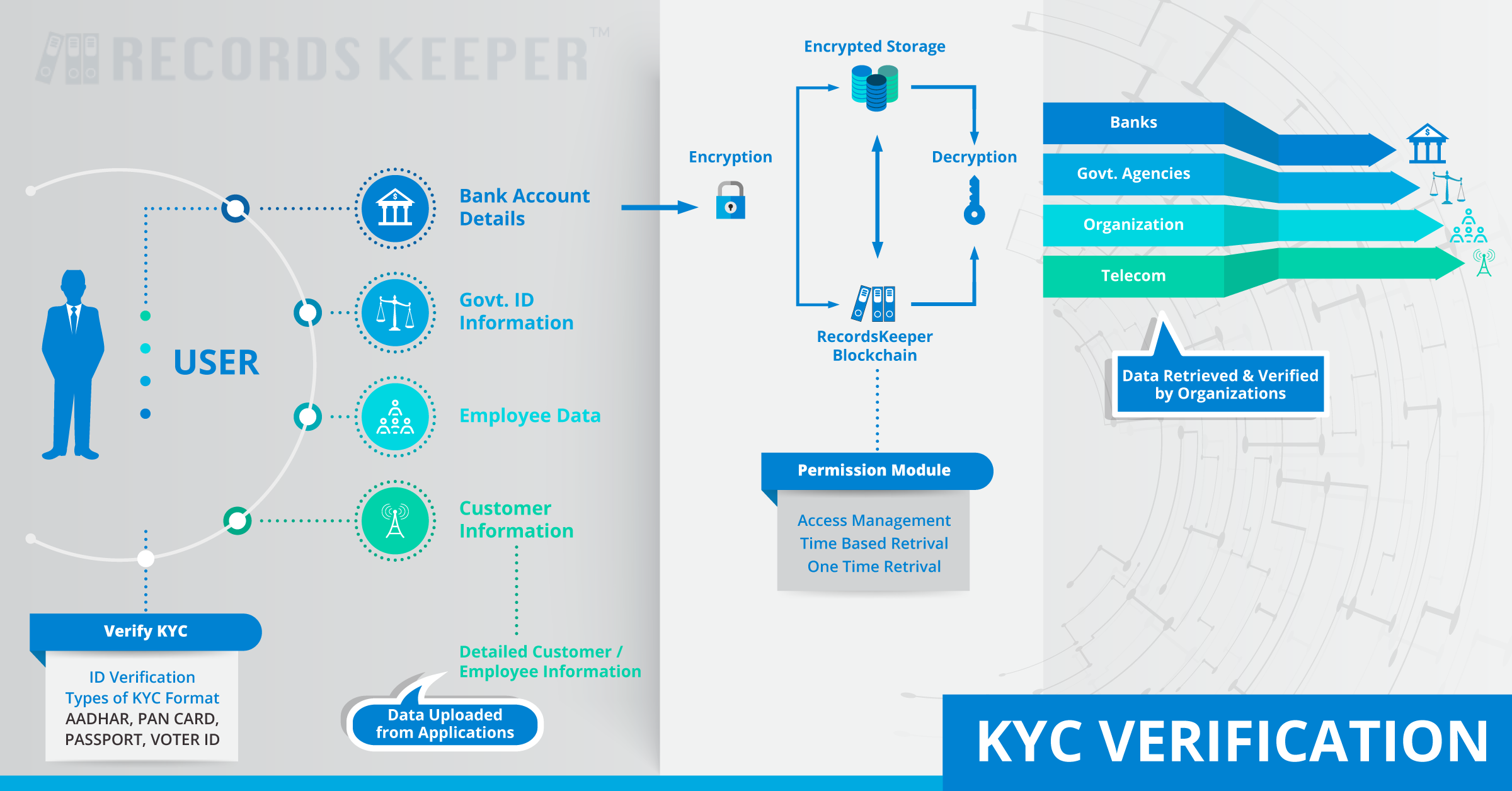
The adoption of blockchain technology could lead to the reduction of AML and KYC costs, thanks to its cross-institution client verification capability, as well as its effectiveness in monitoring and analyzing data required for AML and KYC checks. RecordsKeeper performs this use case flawlessly, without the need to maintain physical documents. The authenticity of these documents can be easily verified because of the nature of the blockchain. RecordsKeeper streams can maintain records of various identification cards, which can be shared and verified when required by any enterprise unit or government agency.
On the RecordsKeeper blockchain, the verification of a client or the legality of a transaction can be determined just once, with the final result cryptographically stored on the RecordsKeeper blockchain. Organizations such as banks or administration services providers would be able to get rid of the multistep AML and KYC processes. More specifically, all of the information related to a client would become available to organizations with the appropriate permissions via a distributed database that would be considered a single source of “truth.” So, when a bank has verified a new client, they can then put the client’s data on RecordsKeeper blockchain which can then also be accessed by other banks and accredited organizations, such as loan providers and insurance companies, without the need for the KYC process to be repeated by another party. These parties would know that the client’s information has been independently audited and verified by various independent miners so that no more KYC checks would be necessary.
Insurance Records Keeping¶
Using RecordsKeeper Blockchain to store insurance records:
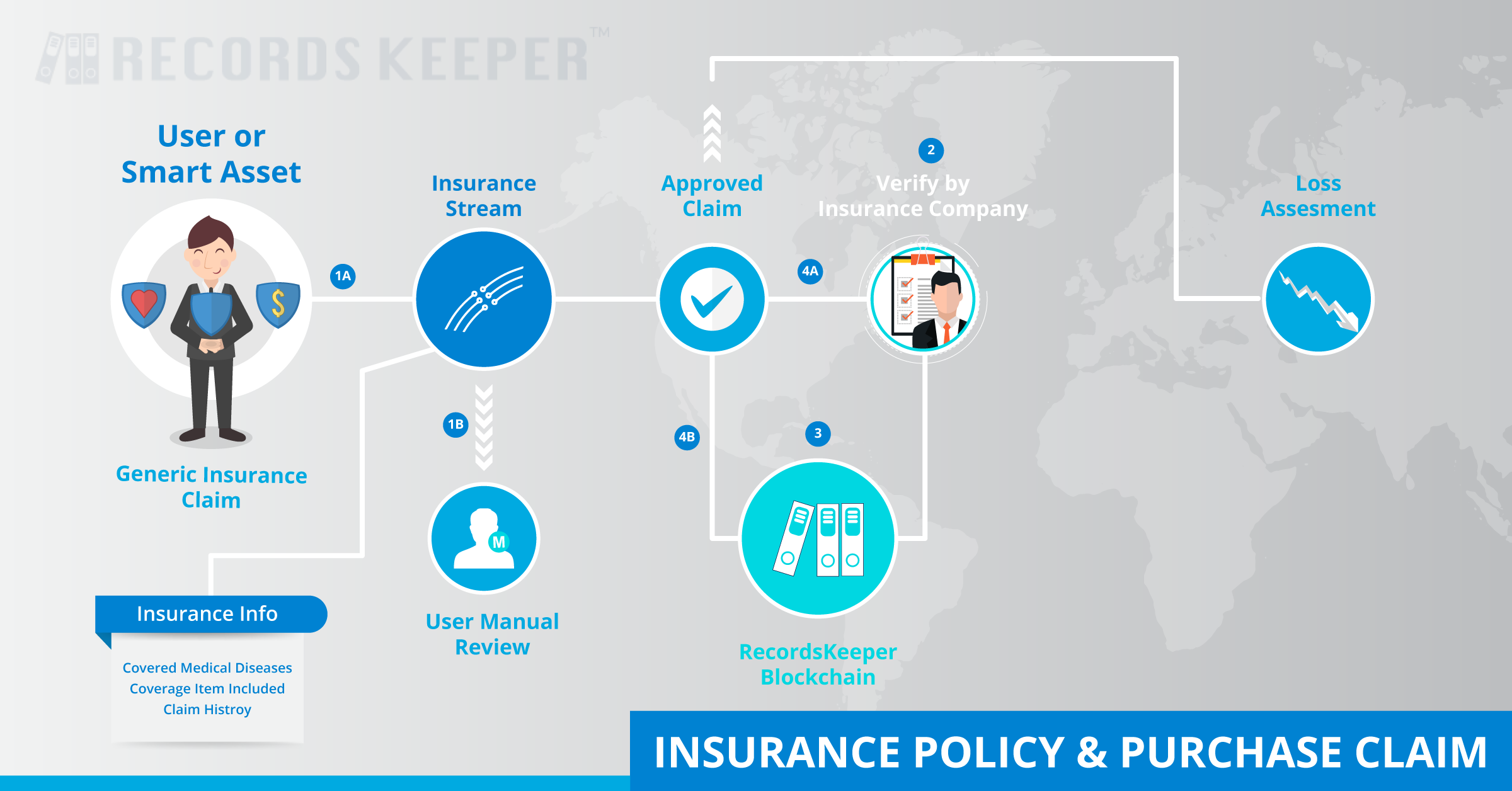
This use case addresses improvements in the operational functions of an insurance company. As per the traditional procedure is shown in the image, when a user makes a general insurance claim, all the insurance information gets verified from the insurance stream manually. If the information is correct, the insurance claim is verified by the insurance company. However, this procedure has the following problems:
- Data Security
- Fraudulent information
- Trust issues
RecordsKeeper can remove all of these problems. RecordsKeeper is a public blockchain for records keeping and data security. Let’s discuss each problem individually:
- Data Security: Data stored in RecordsKeeper is decentralized so there is considerably less possibility of data loss as compared to the present centralized system because a copy of the data is present in every node which is connected to the network. This way, the data can be quickly recovered in the event of data loss.
- Fraudulent information: Unlike with the traditional insurance record keeping system, data stored on the RecordsKeeper blockchain cannot be tampered with or modified. Moreover, insurance companies can easily identify false applications, so there is less chance of fraud.
- Trust issues: For every insurance company, it is imperative to gain the client’s trust. In the traditional process, there are many chances for fraud, so it is not easy for a client to trust the insurance company, but with the help of RecordsKeeper blockchain, trust issues can be resolved.
Corporate Compliances Records Keeping¶
Using RecordsKeeper Blockchain to store Corporate Compliances
One of the most admired features of blockchain technology, from a compliance perspective, is its practical immutability. As soon as data is saved onto the chain, it cannot be modified or removed. This is one of the major features enabling blockchain to be used for the transfer of any digital asset.

RecordsKeeper avoids pain points for financial institutions and regulators. Saving one shared permanent record on the blockchain reduces the need for duplication, which can represent tremendous savings for the entire industry. It would also expedite the regulatory review process since there would no longer be a need for reconciliation. A business unit can monitor regulatory feeds and update their records based on regulations in the RecordsKeeper blockchain. Each compliance document is either acknowledged or dismissed based on the regulations. Every approved document is stored in the RecordsKeeper ledger and can be shared and verified as required.
Verify Academic Certifications¶
Upload and Verify Academic Certifications over RecordsKeeper
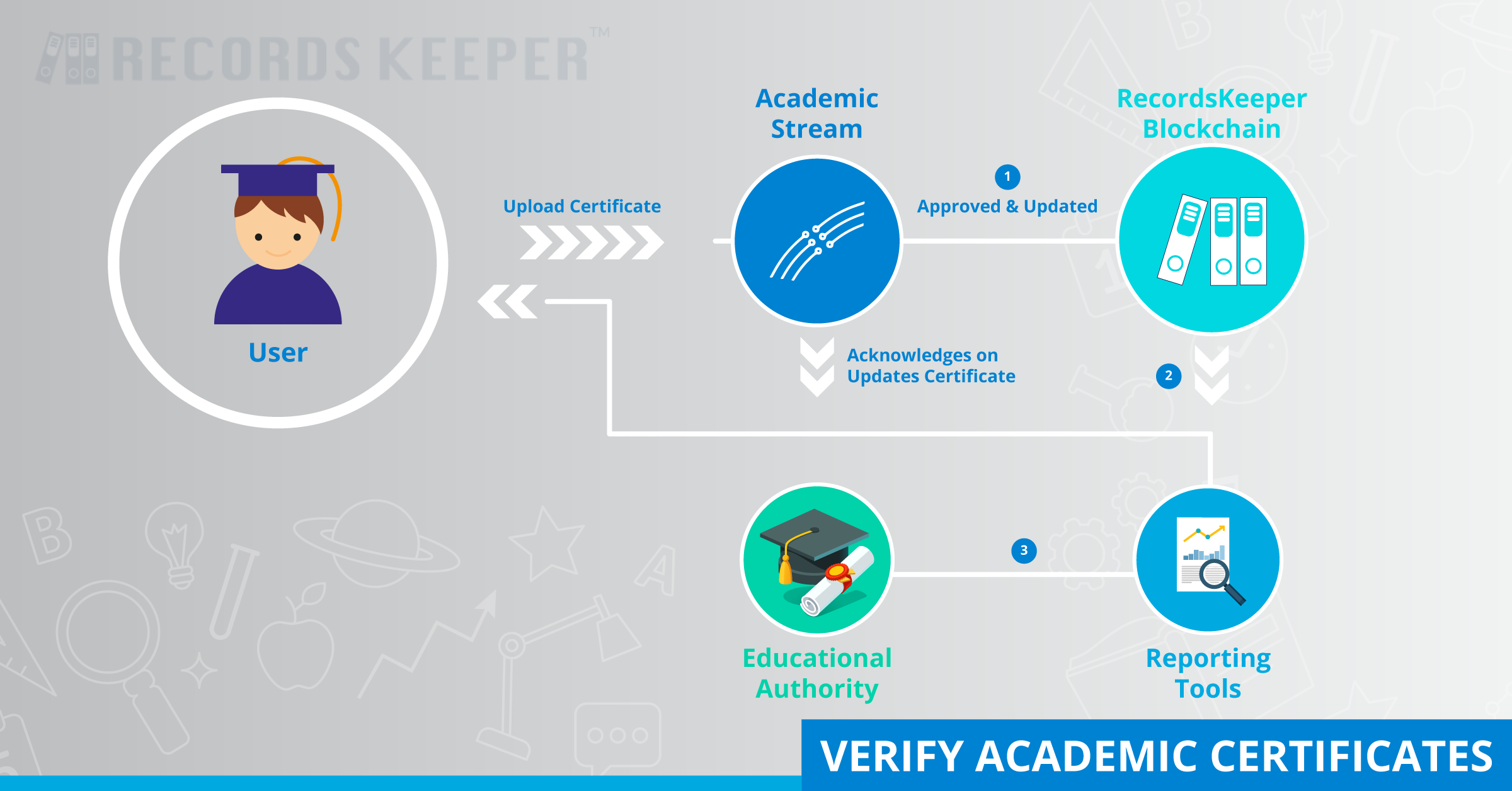
Academic certificates can be easily issued and verified using the RecordsKeeper ledger. Educational authorities can issue a certificate and give the user a receipt which they can share with any third party to prove the authenticity of the certificate. When the third party receives this receipt, they can easily check its authenticity on the RecordsKeeper ledger.
Additionally, RecordsKeeper provides the following features:
Transparency – Both the parties who are interested in viewing academic credentials can see them on the RecordsKeeper blockchain. This ensures that only people with ownership rights can make decisions about who has access to this information.
Immutability – Blockchains are the most secure source for storing the information right now. They rely on the integrity of the network to ensure the authenticity of the stored information. Thus, academic certificates stored on the RecordsKeeper blockchain are immutable.
Disintermediation – Using the RecordsKeeper blockchain to store and share academic credentials helps us bypass the need for a central controlling authority that manages and keeps records. This makes the overall process of storing credentials more trustworthy as there are no middlemen involved.
Collaboration – Once the information becomes available on the RecordsKeeper blockchain, it is much easier to ascribe ownership, and therefore safer to share the information without the fear of this information being compromised.
Supply Chain Management¶
Supply Chain Management over the RecordsKeeper Blockchain
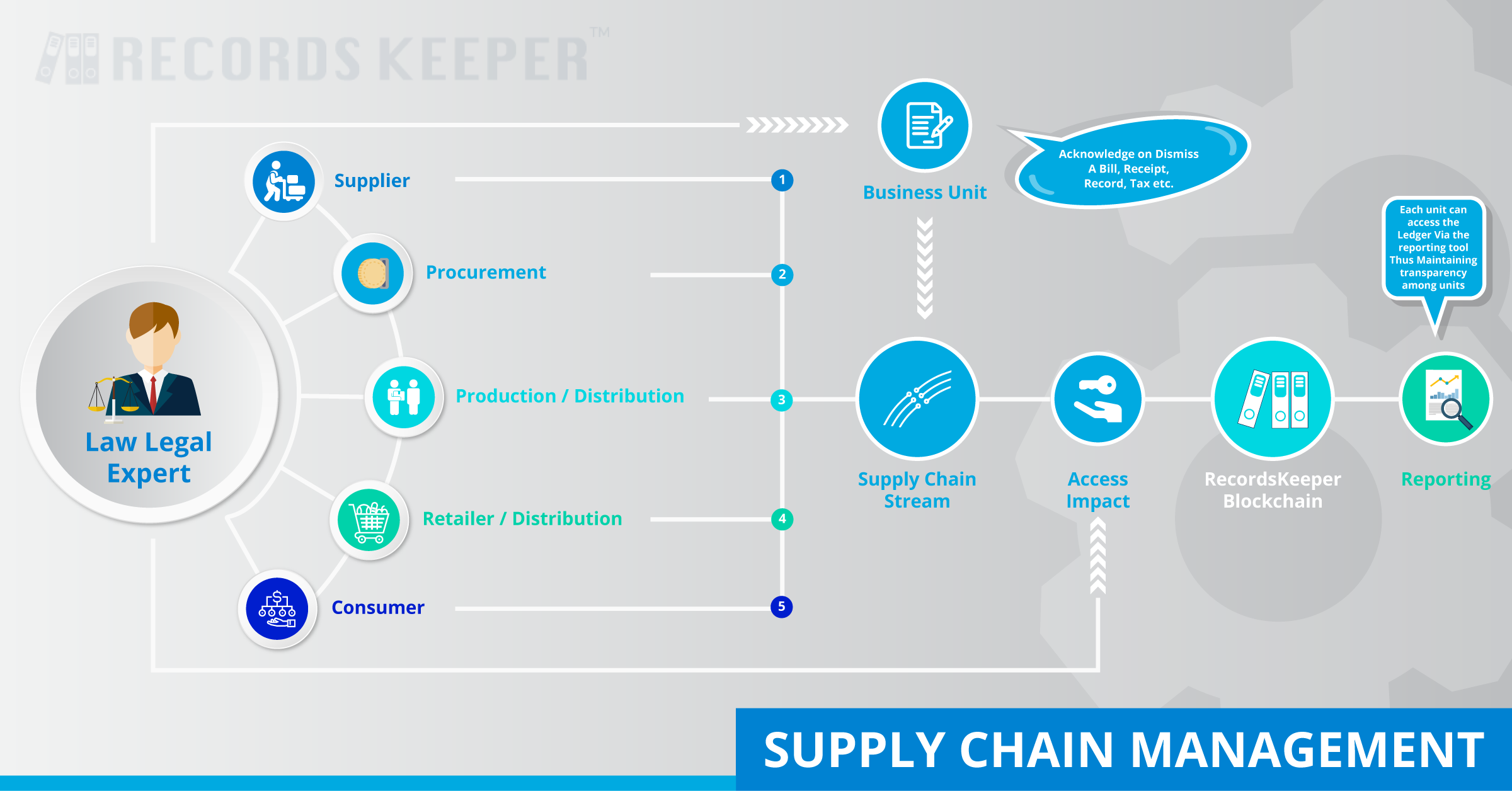
RecordsKeeper can help improve the supply chain management in the following ways:
- Recording the quantity and transfer of assets – such as pallets, trailers, or containers, etc. – as they move between supply chain nodes
- Tracking purchase orders, change orders, receipts, shipment notifications, or other trade-related documents
- Assigning or verifying certifications or certain properties of physical products; for example, determining if a food product is organic or fair trade
- Linking physical goods to serial numbers, barcodes, digital tags such as RFID, etc.
- Sharing information about the manufacturing process, assembly, delivery, and maintenance of products with suppliers and vendors.
Each unit has a set of compliance conditions which need to be followed. RecordsKeeper can make sure that these are being followed, throughout the process. For each unit, the current status of the supply and its related compliance is approved and recorded in the ledger by the unit itself, thus helping to maintain transparency among all units. RecordsKeeper will store copies of receipts, orders, or notifications, etc. and will make sure that their integrity is maintained. RecordsKeeper helps businesses set the rules for recording the data so that they can set the compliance conditions themselves. Only when the conditions are met does RecordsKeeper allow the user to share the data.
Trustless File Sharing¶
Trustless File Storing and Sharing over RecordsKeeper Blockchain
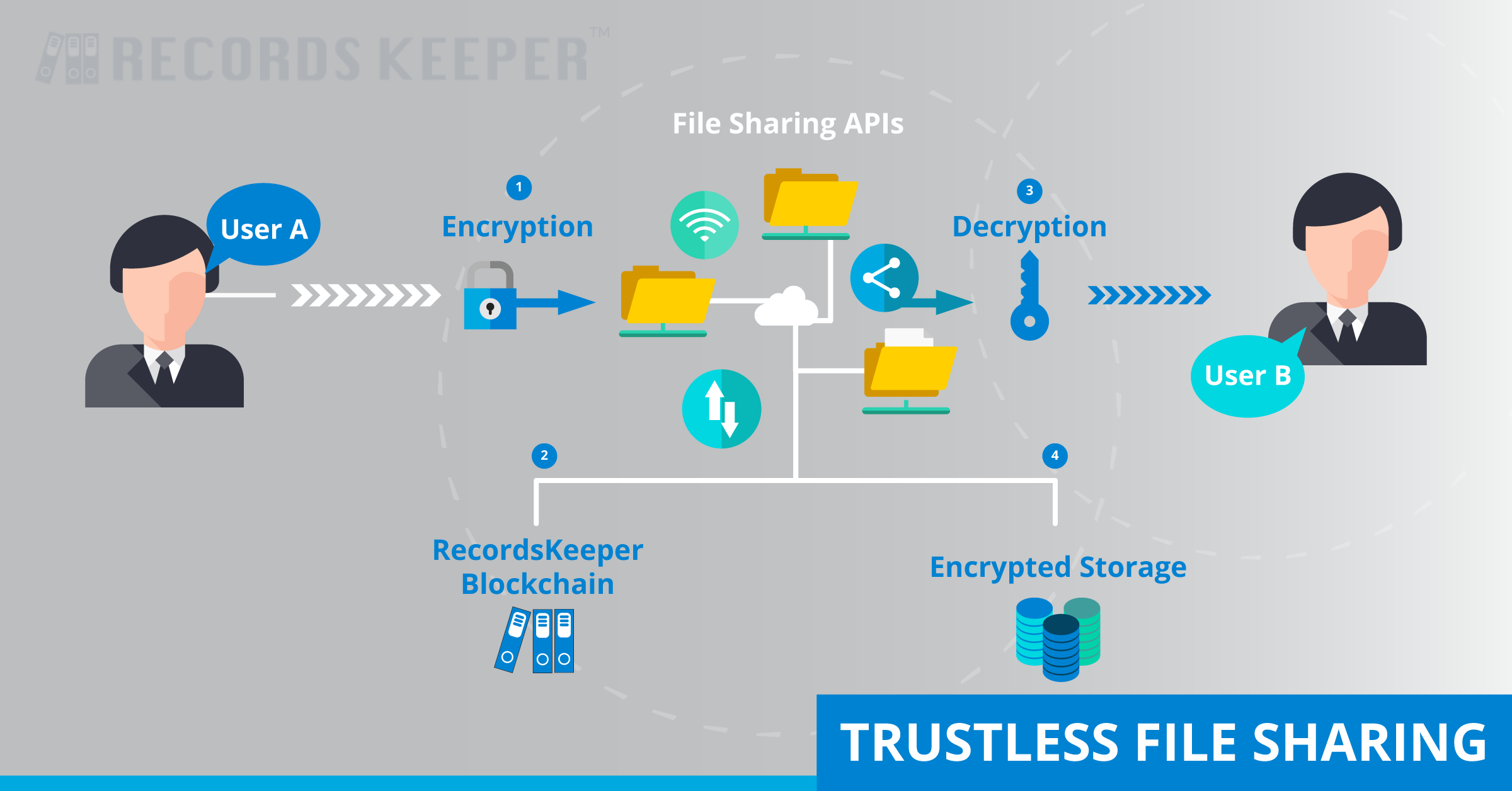
Data sharing has always been prone to attacks, hackers are always present in a search for ways to hack any data by means of channel diversion or accessing the encrypted transferred data. RecordsKeeper can be used for creating a system which will help in sharing data over the network securely. This system will encrypt the file with receiver’s public key before sharing. Once the receiver receives the file, they can decrypt it using their private keys. At each stage, the Recordskeeper will maintain the metadata of the file and keep track of all the changes made in it. Thus, both the parties can verify if a document has been manipulated or not.
The primary benefit of using RecordsKeeper Blockchain for file sharing is the safety of the data. Information present on RecordsKeeper Blockchain is immutable and unalterable which makes it safe and secure. In case of the RecordsKeeper Blockchain, if a user uploads a file then the hash of the file gets stored in the Blockchain and then the user can verify the authenticity of the file by using the hash and claim the ownership.
Government Regulations¶
Government Regulation Policies on the RecordsKeeper Blockchain
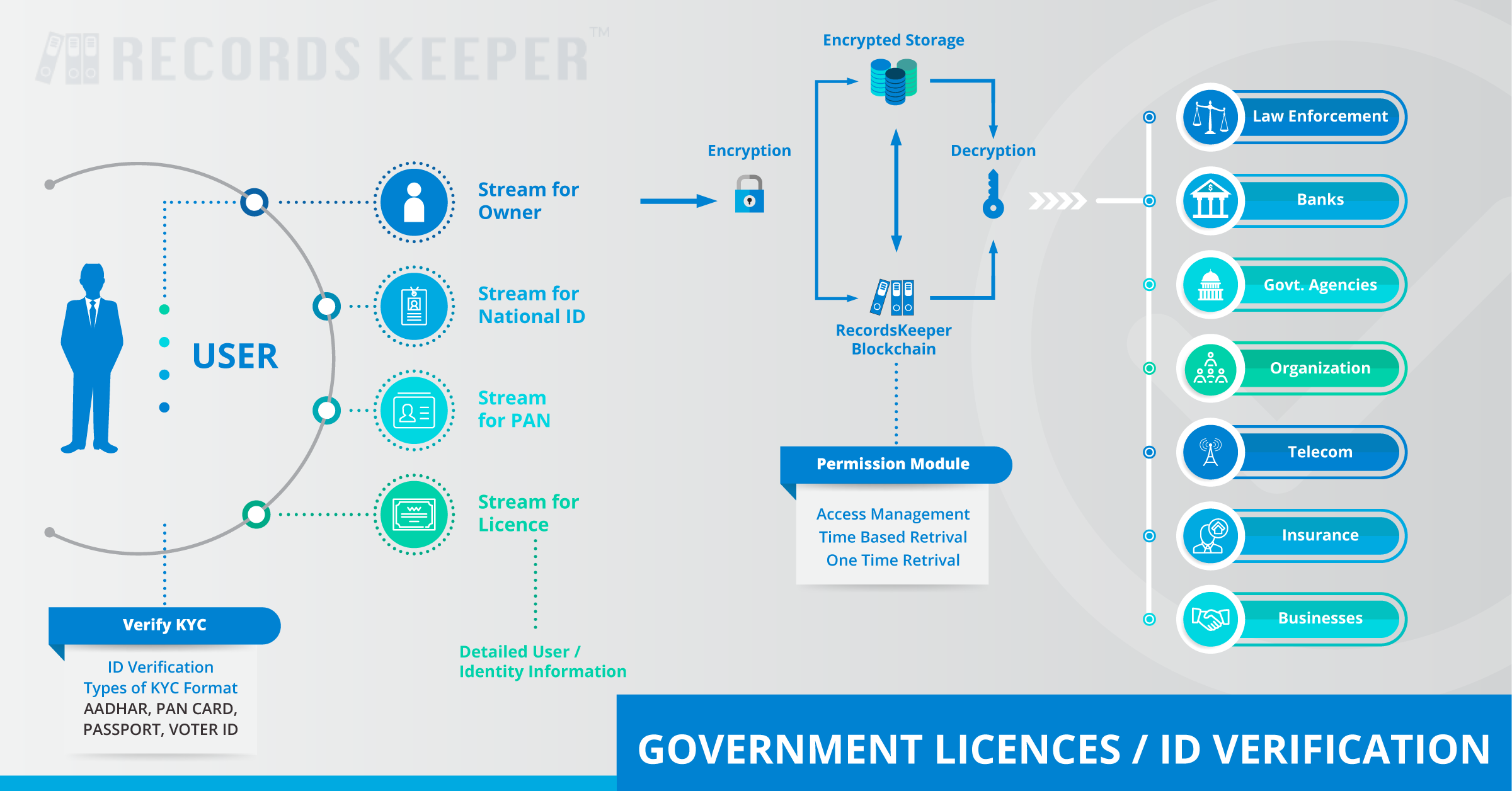
Identification documents are a tedious but necessary responsibility for all citizens. These documents can be easily faked, which has a direct impact on many government agendas; for example, governments are often not able to implement health or food policies efficiently due to partial or misleading information. RecordsKeeper can be effectively used as a solution to this problem; records with proper and unalterable information can be saved in the RecordsKeeper ledger, which can be easily accessed when required.
This information is safe with RecordsKeeper as the details of the document are saved in the ledger, making the verification process effortless. The RecordsKeeper platform aims to significantly reduce the amount of time and resources spent on cross verification of identification documents. Once the data is stored on the RecordsKeeper blockchain with the document hash, users can claim ownership of the files. By this mechanism, the risk of fake document creation is significantly reduced. Thus, with the help of RecordsKeeper, we can increase the authenticity of government identification documents.
Land Ownership Record Keeping¶
Land Ownership verification on the RecordsKeeper Blockchain
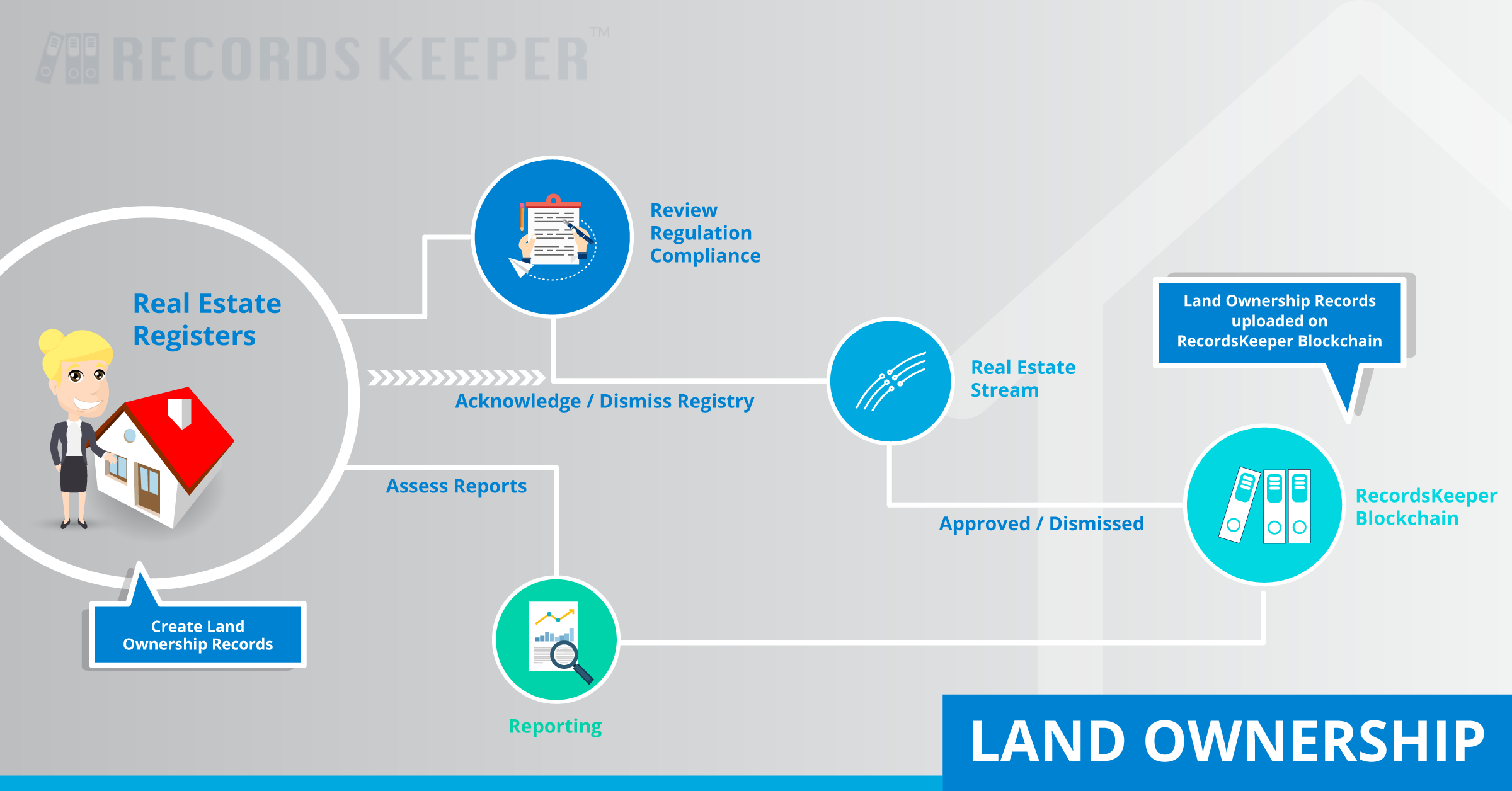
For any high-value property (such as real estate, cars, or artwork) it is essential to have accurate records which can identify the owner. These records are used to protect owners’ rights in various situations: for example, in the case of theft, in resolving disputes, or in the transfer of ownership after a sale. Thus, it is necessary to maintain not only the accuracy but also the completeness of this information to prevent unauthorized and fraudulent actions.
Currently, people have to rely on a trusted third party. For example, a government agency might be responsible for keeping track of ownership information. Sometimes, these records are not preserved systematically. RecordsKeeper solves this problem entirely, as it provides a way of sanctioning, approving, and saving all sorts of asset information which can never be falsified or altered.
The current process for clearing a land deed is very complicated and requires house buyers to hire an intermediary to clear the land deed for them. This is a complete waste of resources, both human and monetary, to accomplish something that can easily be done with the help of a public blockchain such as RecordsKeeper’s. In addition to making the process a whole lot more efficient, registering land deeds on a public blockchain also ensures that owner information cannot be manipulated in any way, adding another layer of security for homeowners.
Employee Verification¶
Employee Credential Verification on the RecordsKeeper Blockchain
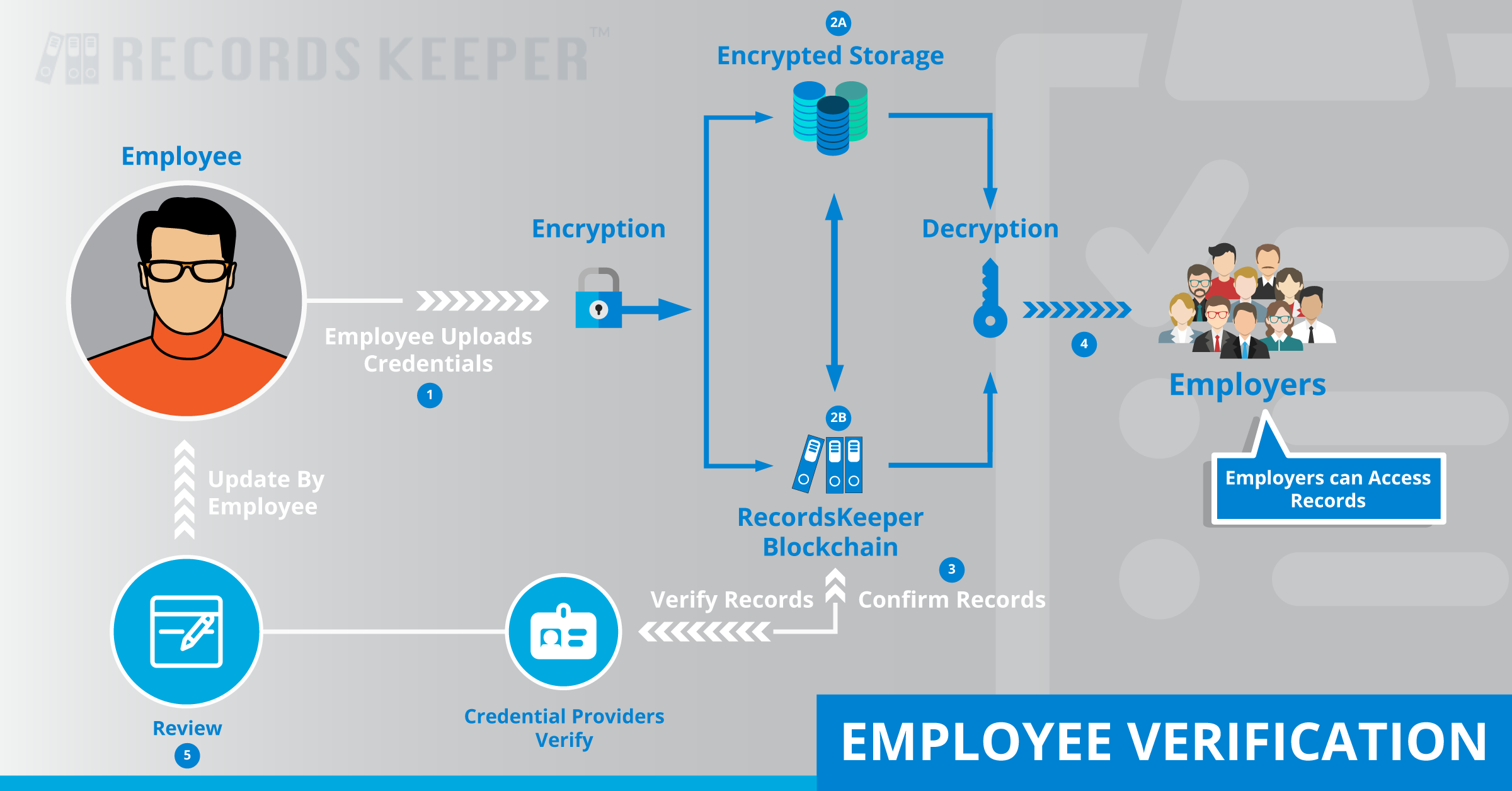
Employers face a major hurdle in hiring employees when they require verification of candidates’ credentials. A survey conducted by one of the largest online job finder sites, CareerBuilder, found that a staggering 58% of employers have found fraudulent details on the resumes of individuals. A separate report on the 2015 hiring outlook done by HireRight, a company offering global background checks, employment verification services, and drug testing shows that screening of misrepresented resumes is required for 86% of employers. There is no doubt that resume accuracy is a common problem in the current environment and the effort required to verify credentials impacts the hiring process and costs employers time and money. This is where RecordsKeeper will increase transparency and address fraud in employee credentials.
RecordsKeeper helps employers in verifying employee details, by allowing for the inspection of the source of their funds, business interests, and employment history. They can also monitor the verification progress along the way. Every employer has to perform the KYC process individually and upload the validated information and documents to RecordsKeeper where it is stored as digitized data and tagged with a unique identification number for each customer. By using this reference number, the employer can access the stored data to perform due diligence whenever employees apply for a new job.
Health Record Manifest In Judiciary¶
Health Record Manifest requirements for Judiciary on the RecordsKeeper Blockchain
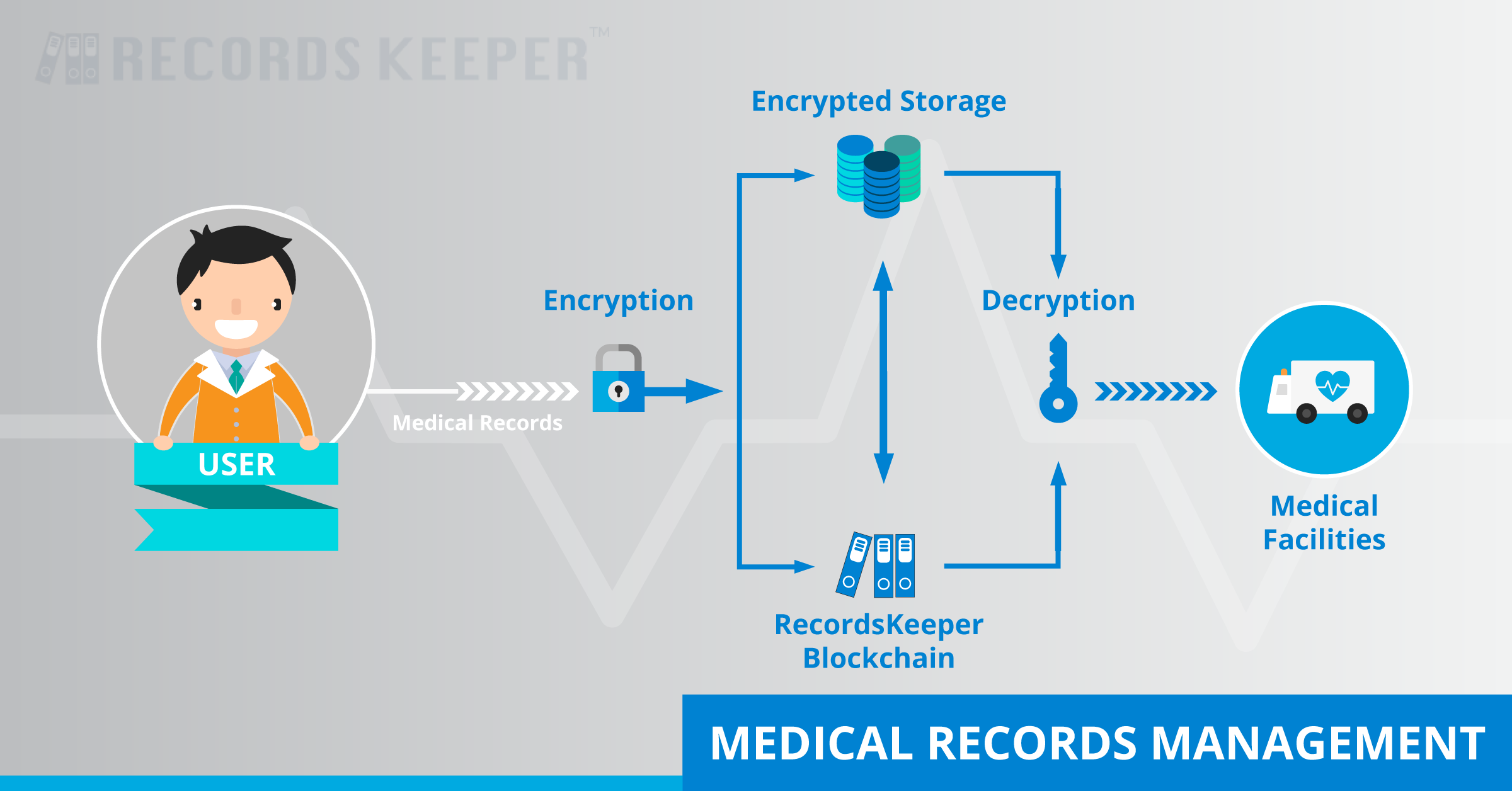
In today’s digital society, everyone is concerned about the privacy and security of their data, especially in health care. So we need more transparency in medical information to protect patients’ privacy and reduce possible security breaches. People nowadays are faking their health status and problems to claim health insurance while some also fake medical cases to claim fraudulent benefits. These cases, when taken to court, become complicated due to the lack of judicial system assertions. RecordsKeeper enables the sharing of information on a secure, tamper-proof, and immutable platform. Nothing can be tampered with or fraudulently conveyed in the RecordsKeeper ledger. Once the record is saved, it is easily verifiable, stays in the system, and is easily accessible.
By using the RecordsKeeper blockchain hospitals can store a patient’s data, and it will remain immutable. Doctors can completely track a patient’s progress. Also, there is another significant advantage: if a New Yorker has a medical emergency on vacation in Switzerland, for example, then the Swiss doctors can track her data from a New York hospital and can provide better treatment because the data is immutable and present on the distributed public ledger. So, we believe that with the help of RecordsKeeper, we can completely revolutionize the health industry.